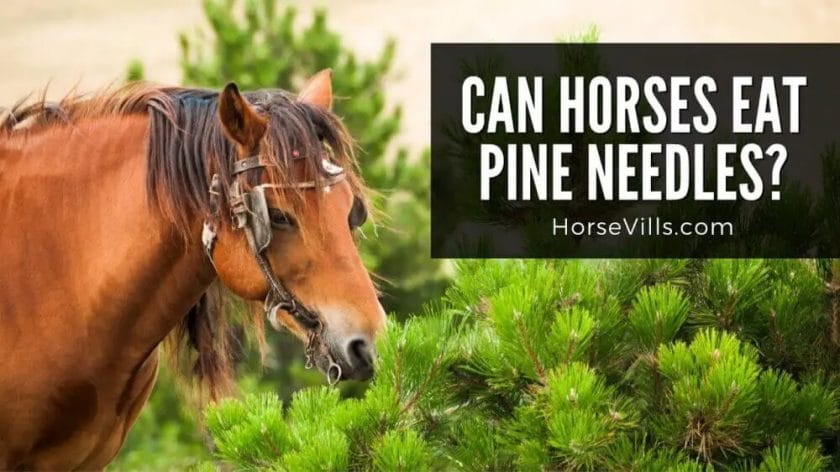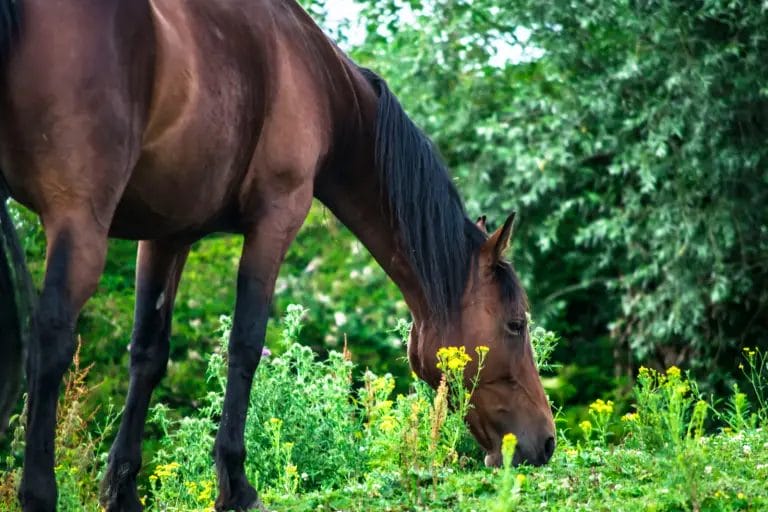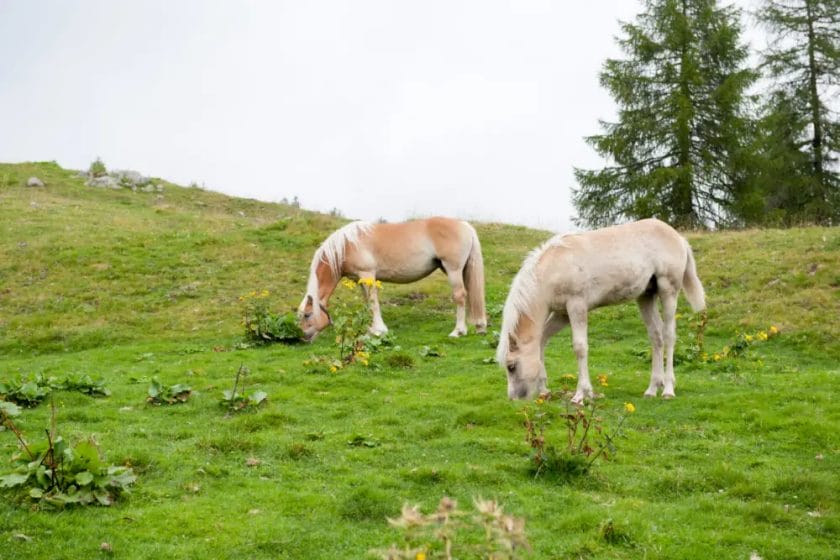Horses are herbivores and naturally grazers, but can they consume pine needles? While pine needles are not toxic to horses, they are not a suitable dietary source for them. Pine needles lack the necessary nutrients horses require for a balanced diet, making them a poor choice as feed. Additionally, the sharp and tough nature of pine needles can potentially cause digestive issues and injury to the horse’s mouth and digestive tract. It is best to provide horses with a diet that consists of appropriate forages and concentrates to meet their nutritional needs.

Potential Risks of Horses Consuming Pine Needles
Horses are herbivores, and they primarily consume grasses, hay, and other vegetation that is safe and suitable for their digestive system. However, there are certain plants and substances that can pose a risk to their health if ingested. One such plant is pine needles, which are commonly found in areas with pine trees.
While horses may occasionally nibble on plants out of curiosity or boredom, it is important to be aware of the potential risks associated with them consuming pine needles. Here are some of the potential risks:
1. Gastrointestinal Issues
Pine needles contain compounds such as resin and turpentine, which can be harmful to horses when ingested. These substances can irritate the lining of the horse’s stomach and intestines, leading to gastrointestinal upset. Symptoms may include colic, diarrhea, or even gastric ulcers.
2. Choking Hazard
Pine needles can be sharp and prickly, especially when dried. If a horse consumes a large quantity of pine needles or ingests them too quickly, it can lead to a choking hazard. The sharp needles can get stuck in the horse’s throat or esophagus, causing discomfort, difficulty swallowing, and potential respiratory issues.
3. Toxicity
Some varieties of pine trees, such as the ponderosa pine, contain toxic substances called isocupressic acid and pimaric acid. When horses consume these toxins, it can lead to various health problems. Symptoms of pine needle toxicity in horses may include lethargy, decreased appetite, depression, and in severe cases, organ damage.
4. Dental Problems
Pine needles, especially if they are long or sharp, can create dental issues for horses. When chewing on pine needles, horses may experience tooth fractures, gum irritation, or damage to their oral cavity. This can lead to discomfort while eating, difficulty maintaining proper nutrition, and potential long-term dental issues.
It is essential to take precautions to prevent horses from consuming pine needles. Here are some measures you can take:
1. Proper Pasture Management
Ensure that your horse’s grazing area is free from pine trees or any other plants that may pose a risk. Regularly inspect pastures and remove any fallen pine needles to minimize the chances of accidental ingestion.
2. Providing Adequate Forage
Make sure your horse has access to high-quality forage, such as grass hay or alfalfa, to meet their nutritional needs. Providing them with enough suitable food will reduce the likelihood of them seeking out alternative vegetation like pine needles.
3. Environmental Enrichment
Prevent boredom by providing environmental enrichment for your horse. This can include toys, companionship, and other activities that keep them mentally and physically stimulated. A content and occupied horse will be less likely to resort to consuming potentially harmful plants.
4. Veterinary Consultation
If you suspect that your horse has consumed pine needles or is exhibiting any unusual symptoms, it is crucial to consult with your veterinarian. They will be able to provide appropriate guidance, evaluate your horse’s condition, and recommend any necessary treatments.
In summary, while horses may be curious about consuming pine needles, it is essential to be aware of the potential risks associated with it. Gastrointestinal issues, choking hazards, toxicity, and dental problems are some of the possible consequences. Taking preventive measures and promptly seeking veterinary care if needed can help ensure the well-being of your horse.

Alternative Food Sources for Horses During Winter
When winter arrives, horse owners often face the challenge of providing adequate food for their equine companions. The colder temperatures and limited access to fresh grazing can make it difficult to maintain a horse’s nutritional needs. However, there are several alternative food sources that can help supplement their diet during the winter months.
1. Hay
Hay is a staple food for horses and provides essential nutrients, especially during the winter when fresh pasture is scarce. It is crucial to provide good quality hay to ensure that horses receive enough fiber, which aids in digestion and helps keep them warm. Different types of hay, such as timothy, orchard grass, or alfalfa, can be fed depending on the horse’s specific needs.
2. Haylage
Haylage, a fermented forage, is an excellent alternative to dry hay during the winter. It retains more moisture and nutrients compared to traditional hay, making it easier for horses to digest. Haylage also has a higher water content, which helps keep horses hydrated when fresh water sources may be frozen.
3. Beet Pulp
Beet pulp is a highly digestible source of fiber that can be soaked in water to make it easier for horses to consume. It is an excellent option for horses with dental issues or senior horses who may struggle with chewing hay. Beet pulp can be mixed with other feeds or used as a standalone supplement to provide additional calories and fiber.
4. Silage
Silage is a fermented feed made from chopped and compressed grass or other forage crops. It is a high-energy food source that can be an excellent option for horses that require increased calorie intake during the winter. Silage should be stored properly to prevent spoilage and ensure its nutritional value.
5. Grain-Based Feeds
Grain-based feeds, such as oats, barley, or corn, can be utilized to provide additional energy to horses during the winter months. These feeds should be introduced gradually and tailored to each horse’s specific nutritional needs. It is essential to monitor the horse’s body condition and adjust the grain ration accordingly.
6. Oil Supplements
Adding oil supplements, such as vegetable oil or flaxseed oil, to a horse’s diet can help maintain their body condition during winter. Oil is a concentrated source of calories and provides healthy fats, which are essential for energy and maintaining a healthy coat. It is important to introduce oil gradually and monitor the horse’s response.
7. Vitamin and Mineral Supplements
In addition to alternative food sources, it may be necessary to provide horses with vitamin and mineral supplements during the winter. Reduced access to fresh grass can result in nutrient deficiencies, so supplementing with a balanced vitamin and mineral mix can help ensure horses receive all the necessary nutrients.
8. Consider Professional Advice
If you are unsure about the best alternative food sources for your horse during winter, it is always a good idea to consult with a veterinarian or equine nutritionist. They can evaluate your horse’s specific needs and provide tailored recommendations to maintain their health and well-being during the colder months.
In summary, providing alternative food sources for horses during winter is crucial to meet their nutritional requirements when fresh grazing is limited. Hay, haylage, beet pulp, silage, grain-based feeds, oil supplements, and vitamin and mineral supplements are all viable options to supplement their diet. It is important to choose the appropriate feed based on the horse’s individual needs and consult with professionals for personalized advice.

Tips for Safely Incorporating Pine Needles into a Horse’s Diet
Pine needles, with their aromatic scent and rich nutrients, can be a great addition to a horse’s diet. However, it is important to ensure that you incorporate them safely and in moderation. Here are some tips to follow when introducing pine needles into your horse’s feed:
1. Choose the Right Pine Needles
Not all pine needles are safe for horses to consume. Make sure you are using needles from non-toxic pine trees such as white pine or ponderosa pine. Avoid using needles from toxic species like yew or Norfolk Island pine, as these can be harmful to your horse’s health.
2. Harvest Fresh Pine Needles
When collecting pine needles for your horse, avoid using those that have fallen on the ground or have been exposed to chemicals, pesticides, or pollution. Freshly fallen needles from healthy pine trees are the best option. Ensure that the area from which you are collecting is free from toxic plants and contamination.
3. Prepare the Needles Properly
Before incorporating pine needles into your horse’s diet, it is essential to prepare them properly. Remove any dirt, debris, or insects from the needles. Cut or crush the needles into smaller pieces to make them easier for your horse to chew and digest. Avoid using needles that are excessively dry or brittle, as they may cause choking or gut obstruction.
4. Start Slowly and Monitor
When introducing pine needles into your horse’s diet, start with small quantities and gradually increase the amount over time. Monitor your horse’s response and watch for any signs of digestive upset or adverse reactions. If you notice any negative symptoms such as colic, diarrhea, or loss of appetite, discontinue feeding pine needles immediately and consult your veterinarian.
5. Balance the Diet
Pine needles should be considered as a supplement to your horse’s regular diet and not as a replacement for essential nutrients. Ensure that your horse’s overall diet is well-balanced and meets their specific nutritional needs. Consult with a qualified equine nutritionist to determine the appropriate amount of pine needles to include based on your horse’s age, weight, activity level, and overall health.
6. Be Aware of Allergies
While pine needles are generally safe for horses, it is important to be aware of any potential allergies or sensitivities. Some horses may have a reaction to pine needles, resulting in respiratory issues or skin irritation. If you notice any unusual symptoms after introducing pine needles, consult your veterinarian immediately.
7. Regularly Inspect and Refresh
Inspect the pine needles before feeding them to your horse to ensure they are still fresh and free from mold or spoilage. Replace the pine needles regularly to maintain their nutritional value and prevent any potential health risks.
8. Consider Professional Advice
If you are unsure about incorporating pine needles into your horse’s diet or have any concerns, it is best to seek advice from a veterinarian or equine nutritionist. They can provide personalized guidance based on your horse’s specific needs and help you make informed decisions regarding their diet.
By following these tips, you can safely incorporate pine needles into your horse’s diet, providing them with a delicious and nutritious addition to their meals. Remember to always prioritize your horse’s health and well-being by seeking professional advice when necessary.
Signs of Pine Needle Toxicity in Horses
Pine needle toxicity can be a serious condition that affects horses, and it is important for horse owners and caretakers to be aware of the signs and symptoms. The consumption of pine needles by horses can lead to various health issues, and prompt treatment is necessary to ensure the well-being of the animal. Here are some common signs that may indicate pine needle toxicity in horses:
1. Gastrointestinal Distress
One of the primary signs of pine needle toxicity in horses is gastrointestinal distress. Horses may experience abdominal pain, colic, and discomfort. They may exhibit signs of distress such as pawing the ground, rolling, excessive sweating, and increased heart rate. It is crucial to monitor the horse closely and seek veterinary attention if any of these symptoms occur.
2. Difficulty Breathing
Ingesting pine needles can also cause respiratory issues in horses. If a horse has consumed a significant amount of pine needles, it may develop respiratory distress. This can manifest as coughing, wheezing, difficulty breathing, and nasal discharge. These symptoms should not be taken lightly and require immediate veterinary intervention.
3. Changes in Urination
Pine needle toxicity can affect the urinary system of horses. Owners may notice changes in the frequency or color of the horse’s urine. Dark urine or a decrease in urination can be indications of a potential problem. Consulting with a veterinarian is crucial if any abnormalities in the horse’s urinary patterns are observed.
4. Depression and Lethargy
Horses affected by pine needle toxicity may display signs of depression and lethargy. They may appear uninterested in their surroundings, exhibit a low energy level, and have a decreased appetite. These behavioral changes should be taken seriously, as they can indicate underlying health issues.
5. Neurological Symptoms
In severe cases, pine needle toxicity can lead to neurological symptoms in horses. These can include stumbling, weakness, lack of coordination, and even seizures. If a horse exhibits any neurological abnormalities, immediate veterinary attention is necessary to prevent further complications.
Treating Pine Needle Toxicity in Horses
When it comes to treating pine needle toxicity in horses, prompt action is crucial to ensure the best possible outcome. Here are some steps that can be taken to address pine needle toxicity:
1. Contact a Veterinarian
If you suspect that your horse has ingested pine needles or is displaying signs of pine needle toxicity, it is important to contact a veterinarian immediately. They will be able to provide guidance and may advise you to bring the horse in for a thorough examination and appropriate treatment.
2. Limit Access to Pine Trees
While treatment is ongoing, it is essential to limit the horse’s access to pine trees or areas where pine needles may be present. This will help prevent further ingestion and reduce the risk of complications.
3. Supportive Care
During the treatment process, the veterinarian may provide supportive care to the horse. This can include administering medications to alleviate pain and discomfort, intravenous fluids to maintain hydration, and other treatments tailored to the specific symptoms the horse is experiencing.
4. Monitoring and Follow-up Care
After initiating treatment, it is important to closely monitor the horse’s progress. Follow-up appointments with the veterinarian may be necessary to ensure that the horse is responding well to treatment and to make any necessary adjustments.
In summary, pine needle toxicity can have serious implications for horses, and recognizing the signs and symptoms is crucial for early intervention. If you suspect your horse has ingested pine needles or is displaying any concerning symptoms, contact a veterinarian immediately for proper diagnosis and treatment.
FAQs
Can horses eat pine needles?
No, horses should not eat pine needles. Pine needles contain substances that can be toxic to horses, such as essential oils and resins. Ingestion of pine needles can lead to digestive upset and potentially more serious health issues in horses.
Conclusion
In conclusion, while horses have a natural grazing instinct and can consume a wide variety of vegetation, including grasses, certain precautions should be taken when it comes to their diet. Pine needles are not recommended for horses as they can be harmful and potentially toxic. The high resin content in pine needles can cause digestive issues and pose a risk of impaction colic. It is important for horse owners to provide a balanced and appropriate diet for their equine companions, ensuring they have access to quality forage and consulting with a veterinarian or equine nutritionist for specific dietary recommendations.
